 Some people run marathons, other people read (almost) the whole Man Booker shortlist in two weeks. I’m in the latter category.
Some people run marathons, other people read (almost) the whole Man Booker shortlist in two weeks. I’m in the latter category.
A friend posed a challenge – read the whole Man Booker Shortlist before the winner was announced. It sounded like my kind of challenge, so I immediately signed up and downloaded the books. Well, five out of the six, that is. The sixth book wasn’t available until the day the winner was announced. I raced through the 5 that were available. Here are some thoughts about the five that I did read, in the order I read them. All of these titles are highly recommended, with the exception of one that I readily admit must be a problem with me and not the book.
By the way, the elusive sixth book won the prize. I still haven’t read it, but I’ll write about it once I do.
With thanks to Shoshana Marchand for the inspiration. And let me know if you want to be in on the challenge next year.
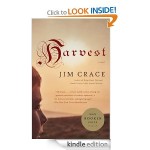 This allegorical novel about the pastoral English countryside on the brink of change felt like a jewel-box – small but exquisitely crafted, self-contained but beautiful. Within an extremely condensed time frame, a community is forced to transition as one economy gives way to another. As a result the community turns on itself and self-destructs. The beauty of this slow-moving but nuanced novel is in the finely drawn detail in which every corner of the landscape is distinctive, every plant tells a story, and every seemingly small turn of events portends major plot developments.
This allegorical novel about the pastoral English countryside on the brink of change felt like a jewel-box – small but exquisitely crafted, self-contained but beautiful. Within an extremely condensed time frame, a community is forced to transition as one economy gives way to another. As a result the community turns on itself and self-destructs. The beauty of this slow-moving but nuanced novel is in the finely drawn detail in which every corner of the landscape is distinctive, every plant tells a story, and every seemingly small turn of events portends major plot developments.
We Need New Names, by NoViolet Bulawayo
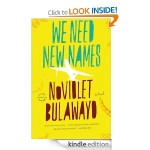 Reading this was a bit of a roller coaster at first, disorienting with lots of fast ups and downs. It took a while to get attached, but then I got completely sucked in. The author is from Zimbabwe, where the novel is set. It tells the story of Darling, who is ten years old at the start. She and her friends live in a difficult reality, desperately poor in a war-torn country. Half way through, she manages to achieve her dream of getting out and making to America, where she lives with her aunt and enters teenagehood. While it may be true that Darling and her friends could indeed use new names, what they really need is a new reality. Their safety and stability has been taken away by a reality of powerlessness, violence, and illness. And yet when she arrives in America, she is an outsider, an observer in a world that is not fully hers. This is a novel about that outsider experience of being an immigrant, expressing what it is to be an outsider at home, where your daily life is at risk, and to be at home as an outsider, where the risks are of a different sort. Home and safety are always out of reach, and complete integration is not possible. Not only names, but all of language, is a hybrid that doesn’t properly work and yet is jerry-rigged to fit, because what other choice is there but to try to make it work?
Reading this was a bit of a roller coaster at first, disorienting with lots of fast ups and downs. It took a while to get attached, but then I got completely sucked in. The author is from Zimbabwe, where the novel is set. It tells the story of Darling, who is ten years old at the start. She and her friends live in a difficult reality, desperately poor in a war-torn country. Half way through, she manages to achieve her dream of getting out and making to America, where she lives with her aunt and enters teenagehood. While it may be true that Darling and her friends could indeed use new names, what they really need is a new reality. Their safety and stability has been taken away by a reality of powerlessness, violence, and illness. And yet when she arrives in America, she is an outsider, an observer in a world that is not fully hers. This is a novel about that outsider experience of being an immigrant, expressing what it is to be an outsider at home, where your daily life is at risk, and to be at home as an outsider, where the risks are of a different sort. Home and safety are always out of reach, and complete integration is not possible. Not only names, but all of language, is a hybrid that doesn’t properly work and yet is jerry-rigged to fit, because what other choice is there but to try to make it work?
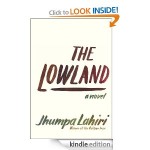 This novel of deep beauty and grace, also shortlisted for the National Book Award, explores the ripple effects of time, place, and events in the world across lives and generations. Here too, as in Harvest above, there are gorgeous descriptions of place and landscape, both in India and in Rhode Island. This the story of a family, beginning with two brothers in India in the 1960’s. Though closely intertwined as boys, as they become young adults one gets caught up in the politics of protest and change, while the other chooses the life of academia and moves to the United States. The themes of self and other, and of forgiveness and anger, run through this tale of these two brothers, whose lives are inexorably bound together despite their different trajectories and fates.
This novel of deep beauty and grace, also shortlisted for the National Book Award, explores the ripple effects of time, place, and events in the world across lives and generations. Here too, as in Harvest above, there are gorgeous descriptions of place and landscape, both in India and in Rhode Island. This the story of a family, beginning with two brothers in India in the 1960’s. Though closely intertwined as boys, as they become young adults one gets caught up in the politics of protest and change, while the other chooses the life of academia and moves to the United States. The themes of self and other, and of forgiveness and anger, run through this tale of these two brothers, whose lives are inexorably bound together despite their different trajectories and fates.
The Testament of Mary, by Colm Toibin
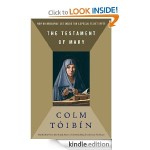 I wanted to like this one, I really did. I wanted this to be a sort of modern midrash on Mary. I wanted a new perspective on Mary, I wanted to connect to her story and understand it better. That didn’t happen. The writing kept her at a distance; it was as if we were invited to look at her through a screen. Jesus was depicted as a naïve young man, almost like someone on the spectrum who didn’t understand how to really connect with people or what was happening around him. The writing felt strained and flat, and I didn’t gain new insights. I realize it must be me – after all, this book was written by a master novelist and was nominated for the Man Booker Prize. I really wanted to like this one…
I wanted to like this one, I really did. I wanted this to be a sort of modern midrash on Mary. I wanted a new perspective on Mary, I wanted to connect to her story and understand it better. That didn’t happen. The writing kept her at a distance; it was as if we were invited to look at her through a screen. Jesus was depicted as a naïve young man, almost like someone on the spectrum who didn’t understand how to really connect with people or what was happening around him. The writing felt strained and flat, and I didn’t gain new insights. I realize it must be me – after all, this book was written by a master novelist and was nominated for the Man Booker Prize. I really wanted to like this one…
A Tale for the Time Being, by Ruth Ozeki
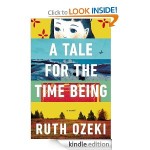 This odd novel veered between a sort of semi-documentary style and a kind of magic realism. Reading it, I often felt off-balance. There are three main characters – Nao, a 16 year old Japanese girl writing in a diary, Ruth, a Japanese American novelist living on a remote Island in the Northwestern United States who finds the diary washed up on a beach in a Hello Kitty lunchbox, and time itself, which zigzags through the tale in sometimes unexpected but always powerful ways. There are other wonderful characters as well, including Nao’s great-grandmother the feminist Buddhist monk, her long dead great uncle the Kamikaze pilot, Ruth’s eccentric husband, and other inhabitants of Ruth’s isolated island. There is a playful quality to this novel as it explores time, and also the relationship between reader and writer, chronicler and audience. Yet many of the other themes in the novel are deadly serious as well – bullying, loss, suicide, faith, war, violence, climate change. It’s a lot to take on, but Ozeki does a masterful job weaving all of this together sumptuously and elegantly.
This odd novel veered between a sort of semi-documentary style and a kind of magic realism. Reading it, I often felt off-balance. There are three main characters – Nao, a 16 year old Japanese girl writing in a diary, Ruth, a Japanese American novelist living on a remote Island in the Northwestern United States who finds the diary washed up on a beach in a Hello Kitty lunchbox, and time itself, which zigzags through the tale in sometimes unexpected but always powerful ways. There are other wonderful characters as well, including Nao’s great-grandmother the feminist Buddhist monk, her long dead great uncle the Kamikaze pilot, Ruth’s eccentric husband, and other inhabitants of Ruth’s isolated island. There is a playful quality to this novel as it explores time, and also the relationship between reader and writer, chronicler and audience. Yet many of the other themes in the novel are deadly serious as well – bullying, loss, suicide, faith, war, violence, climate change. It’s a lot to take on, but Ozeki does a masterful job weaving all of this together sumptuously and elegantly.
